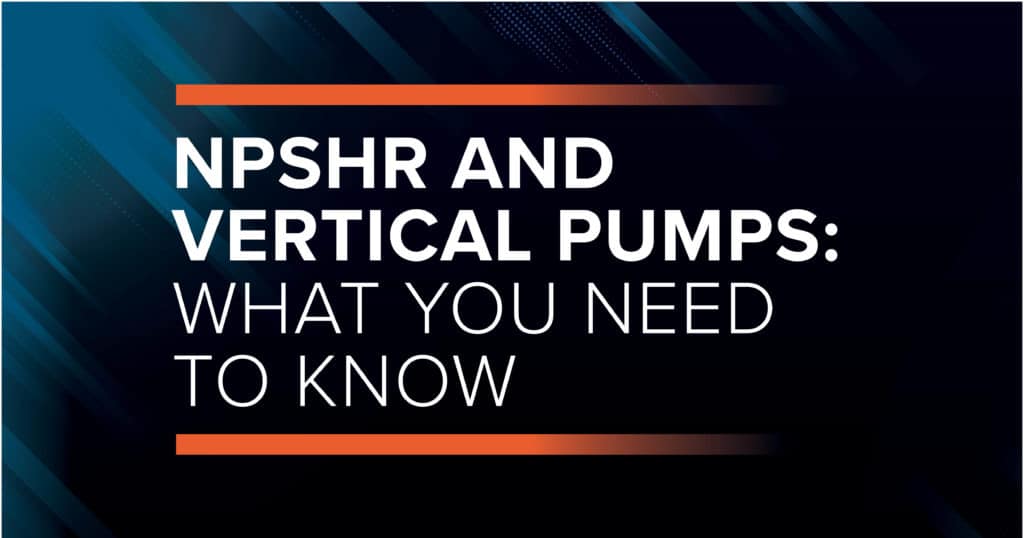Net positive suction head required (NPSHr) is one of the most important measurements for a pumping system. It allows you to set key performance standards and indicators for optimal operating efficiency. Of course, most pumps are horizontally oriented, and the method for determining NPSHr is standard. What about vertical pumps, though?
How Do You Determine NPSHr for a Vertical Pump?
The method is essentially the same as if you were dealing with horizontal pumps. The only significant difference is that the test setup in the testing facility will need to accommodate the vertical pump design. Manufacturers of vertical pumps will have this capability and will let you know the NPSHr as a standard measure of operation.
The most common method for determining NPSHr is to run the pump at a constant flow rate and speed. While it’s running, you can vary the suction head. As the NPSHa (net positive suction head allowed) reduces, you plot the corresponding suction head. Ultimately, a point is reached where the head curve turns away from the straight-line trend. It is at this point where the pump performance begins deteriorating. It is standard practice to measure to the point of NPSH3, representing a critical 3% reduction in head. If you have a multi-stage pump, the 3% only applies to the first stage head.
Why NPSH is Important
The purpose of determining NPSH is to identify and avoid vaporization. If there is more than a 3% reduction, the pump system will not operate efficiently and will lead to excess fluid vaporization as it enters the pump. This condition is also known as “flashing.”
Determining the NPSH curve will show you these critical points in operation. NPSHr is the required head for optimal pump performance. NPSH is the available head when the pump is operating at full speed. Ideally, the pump should maintain consistent performance at variable suction heads—at least up until a point. When you reach that critical loss of 3% head or more (NPSH3), your pump won’t run as efficiently. You lose performance and can end up damaging the equipment over time.
It is essential to understand your application, the pressures, suction heads, and required flow rates production for ideal pump system performance. This will help you select the ideal pump. Manufacturers should provide all the necessary NPSH ratings to help you narrow down your decisions.
Horizontal vs. Vertical Pumps
Whether you use a standard horizontal pump or a vertical configuration depends largely on your operating space. Vertical pumps can be effective when a minimal horizontal area doesn’t allow for a large pump footprint. Vertical pumps will require more vertical space. Understand that vertical pump manufacturers will provide the NPSH ratings is key, and you must factor in this measurement when choosing the best pump for your particular pumping application. Don’t simply assume all vertical pumps are the same because there may be fewer options from which to choose!
FlowServe Vertical Turbine Pumps
FlowServe is one of the world’s leading manufacturers of specialized vertical pumps. Their lineup includes wet-pit, submersible, double-case, slurry and solid handling, sump, and concrete volute vertical pumps. They are available in a variety of sizes and configurations, designed to handle some of the most challenging vertical pumping applications in many different industries:
• Deep Well Submersible Vertical Pumps & Motors
• Double-Case Vertical Pumps
• Slurry Vertical Pumps
• Solids Handling Vertical Pumps
• Sump Vertical Pumps
• Wet-Pit Vertical Pumps
We encourage you to browse through FlowServe’s online catalog. They provide information and performance ratings for every single pump, including NPSHr and NPSHa.
For help with all your pump selection and configuration needs, DXP Pacific is here to lend a helping hand. As an exclusive distributor of FlowServe pumps and accessories, among other leading vertical pump manufacturers, we are equipped you guide you to the best pump for your application. Contact us today to learn more.

